NYFF 2020 Report #2
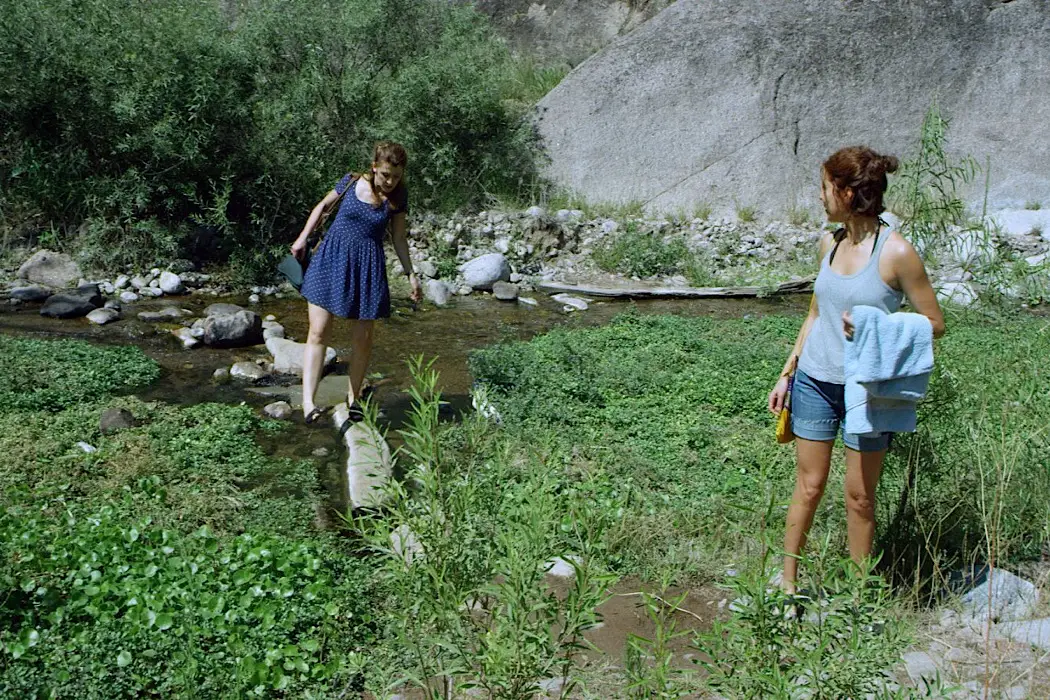
Soham Gadre is a writer/filmmaker in the Washington D.C. area.…
Isabella (dir. Matías Piñeiro)
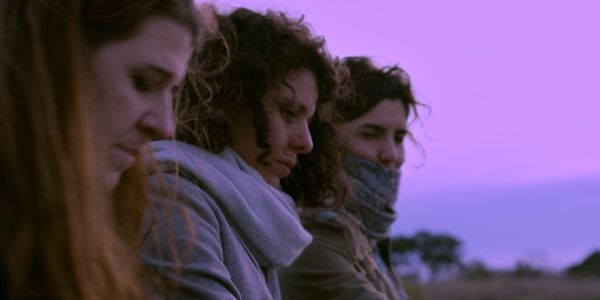
Isabella has all of the makings of a movie I would, could, and should enjoy. From the beginning, it confidently declares itself as a theoretical dive into the ideas of ‘performance’, ‘narrative structure’, and the ways that visual elements play into moods. Shades of blue, green, and purple are used in silent intertitles between detached, non-chronological sequences of two women in Argentina, Marielle (María Villar) and Luciana (Augustina Muñoz), discussing an audition for the role of Isabella in a production of Shakespeare’s Measure for Measure. What Marielle, the ever-eager artist hoping to impress, doesn’t know is that Luciana is also auditioning. These are surrounded by scenes of Luciana walking to and from place to place on a busy street, Isabella working on an art installation with large panels, colored lights, and stones, events after the audition, and the auditions themselves.
Elements from the beginning start to click together in the mind as the movie goes on but this becomes an increasingly monotonous exercise. One has to wonder why these extremely simple dramatic turns must take the long arduous and incongruous road to a conclusion. Non-chronological films serve a very unique purpose in either playing with audience expectations, like in Tarkovsky’s The Mirror or The Wachowski’s Cloud Atlas, or functioning as a meta-analysis of cinema and storytelling like in Kurosawa’s Rashomon or Tarantino’s Pulp Fiction. Isabella engages in rote narrative gimmickry that adds little depth to the proceedings beyond trying to presenting itself as mysterious.
The narrative puzzle that Piñeiro presents held no secrets for me. There really isn’t any narrative or grammatical insight to Isabella beyond understanding that the movie was in fact not totally screwing with your mind but rather consciously organized in a strange way. There’s perhaps a charm to this in the fact that it forces you to pay attention to particular moments, but this also isn’t Pulp Fiction where every scene, impeccably paced and crafted, can stand tall as its own disjointed vignette. Its lack of interest in its constituent parts demands that there be a payoff and it simply doesn’t exist here. The visual metaphors of color, space, and movements of the actresses can only be considered as idiosyncratic fascinations of its director. These choices muddle the proceedings for us in trying to think about where they fit. Isabella is a movie that functions purely as a busy-box for its audience.
Night of the Kings (dir. Phillipe Lacôte)
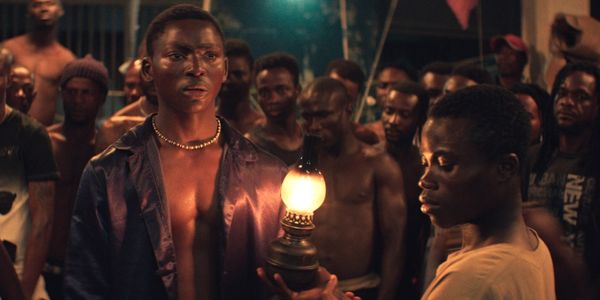
Rich, varied cultural histories of the African continent have made for some of the best and most innovative storytelling in cinema today. Phillipe Lacôte’s Night of the Kings carries on the fusion of storytelling traditions of the past with the present that was also in Mbithi Masya’s phenomenal Kati Kati (2017). Both films exceeded in creating a mythology of an enclosed sub-kingdom of sorts without ever stating the rules outright. While the latter dealt with the metaphysical (it took place in the spiritual afterlife), the former is a tangible, mortal, and more relatable location – a prison.
In a premise similar to that of Scheherazade in Arabian Nights, a young pickpocket (Bakary Koné) is bestowed with the title of “Roman” by Blackbeard (Isaka Sawadogo). Blackbeard is sick and near the end of his reign in this convict-run prison, where the guards stand idly by in their fortified bunker. Blackbeard wants to shed blood one more time and when the red moon reveals itself, he calls for the “Night of the Roman”. The mythology within this mini-kingdom is discussed briefly and never expounded one, which interestingly works to the story’s advantage. By taking the point of view of the Roman, who has literally just come into the prison, Lacôte justifies his audience’s confusion at the proceedings and draws the tension from a rudimentary and instinctual fight for survival. The Roman must tell a story and keep telling it until dawn breaks or else he will be a blood sacrifice for Blackbeard.
The Roman’s story recounts an acquaintance of him named Zama King. Lacote’s artistic choices highlight the cultural history of storytelling of Côte d’Ivoire, particularly that of the griots, who were traveling poets who told stories for entertainment. The Roman’s storytelling is met with rapt attention and there are performances who join in with interpretive movements, synchronized dances, and play-acting. The proceedings take on a grand display that transports us not only into The Roman’s story but a rich tradition of storytelling that is a generations-old fabric of Lacôte’s heritage.
Days (dir. Tsai Ming-liang)

I deeply apologize to the gods of slow cinema for my inability to immerse myself in Tsai Ming-liang’s latest comatose experience. The filmmaker most notable for Goodbye Dragon Inn presents two hours of long static-shot filmmaking centered on two men, Kang (Lee Kang-sheng) and Non (Anong Houngheuangsay), living out their daily lives relaxing, taking massages, cooking dinner, eating out, and praying. During the Q&A at NYFF Tsai mentioned how the movie is “a long and meaningful intense gaze”, which is respectably committed to his singular style and philosophy of observation of ‘real-time’ in his cinema.
The moment which spoke closest to what I can understand as being pleasantly authentic and sensory filmmaking was the long sequence of Non-washing various vegetables and cuts of fish with a hose and cooking them. There is a deeply tranquil feeling to the cool darkness of the fluorescent lighting falling on the floors and walls, the blue-ness of the night all speak to familiar memory, especially as someone who has paid many visits to extended family in Asia. Every frame of the movie is something you’d expect to see in a photography museum, yet nothing kept me hooked longer than a scene here or there. One minute I found something that spoke to me, the next minute everything felt impenetrable, distant, and lost.
Tsai seemed to be speaking to me directly when he mentioned that “if you think such things are boring or meaningless, know that they are deliberate and calculated in order for me to attain that level of realness and authenticity I want”. I feel the need to mention that slow-cinema, as a genre, is not ‘lost’ on me – I’ve enjoyed the gamut of slow filmmakers’ works from Diaz, Tarr, Costa, to Akerman, Weerasethakul, etc. Tsai’s movies are so dependent on the ability of the viewer to connect the same wavelength as the filmmaker in his observations of time, mood, and texture, that there really isn’t anything beyond how you’re feeling in a particular moment while watching it to go on. In that case, my reaction after seeing this on a Thursday night at 11 PM EST, sober, in a fairly natural mood was “…so what”. Perhaps next time it’ll be something different.
Nomadland (dir. Chloe Zhao)
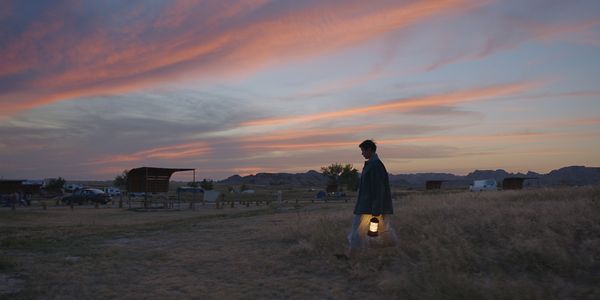
The most heartbreaking aspect of Nomadland is how relevant and seamlessly appropriate the film is for 2020 despite it being based on a non-fiction reportage of the 2008 financial crash. The reportage in question was the book by Jessica Bruder, Nomadland: Surviving America in the 21st Century. Surviving is something that Americans, as a collective whole, haven’t really had to struggle with since the Great Depression. This century however has amassed such an unfathomable amount of economic strife on the populace so as to make the tale of Fern (Frances McDormand) profoundly relatable for others who have experienced job-loss, depletion of money, and/or disenfranchisement from the system, and too close for comfort for even those who haven’t.
Chloe Zhao’s films aim to form an intimate connection between people and land and Nomadland deals with this in both a literal natural sense in the character of Swankie (Charlene Swankie) and a metaphorical sense in Fern. Fern isn’t necessarily imbibed with nature or deeply rooted in some spiritual sense to the soil, air, and grass. She’s a simple woman, who lost everything when her late husband passed away and the sheetrock mine where they made their living shut for good. Fern’s connection to the land is in its constant vastness, the endlessness of its horizon to which she can escape from everyone and everything. This is a central character who has a fear of reliance on other people. It’s hard to ever depend on anything in a country that constantly lets you down.
Fern moves from job to job, season to season, and Zhao’s camera captures her in the director’s trademark establishing shots of golds and greys the loneliness and one-ness with the self that Fern feels and thrives on. Her small moments in the suburbs, where she attempts to reconnect with her sister and meets a friend (or more than a friend) in David (David Strathairn) feel like another planet in Nomadland. Zhao presents these neighborhoods with clean-cut corners and no horizon, drawing the camera close to Fern to exhibit the deep discomfort she feels in this privileged and alien form of stability when she knows this is a country that has completely lost its way.
Malmkrog (dir. Cristi Puiu)
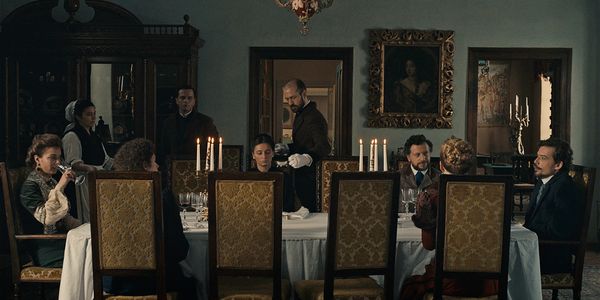
In the fest’s best movie, Cristi Puiu orchestrates a classic Buñuelian premise with abject sternness… but a few solid cracks find themselves showing through anyway. Malmkrog is an elaborate and rewarding straight-faced joke. Where four upper-crust bourgeoise friends (a landowner, a politician, a countess, a General, and his young wife) spend a day at the landowner’s palace and engage in various existential discussions revolving around war, politics, and God. Like moths to a flame, they continually find themselves drawn back in circles through these discussions, which are all of a very pretentious nature. Not unlike Buñuel’s The Exterminating Angel, the draw of being in each other’s company has dynamic effects which, despite many disturbances including the count getting sick, the charade of one-upping each other through dialectic chess of words traps them subconsciously. They feign the notion of being bored a few times but relent without much urging.
Puiu is much more purposefully subtle and that is frustrating for sure, given the fact that Buñuel’s The Discreet Charm of the Bourgeoisie basically used the same sort of the premise of discussing among elites to unravel their theories on political and social conditions and position them as out of touch rubes whose wealth and status preclude them from even the most basic insight on the human condition. Buñuel of course, being the satirist he is, just comes out with it. Puiu evokes moments of surrealism, mainly through sound. During one discussion on race and what it means to be a ‘European’ vs a ‘savage’, they hear loud music from downstairs that continually grows more mirthful and draws closer. It ends with a giant commotion that doesn’t have any real effect on the continuity of their company into the night. The disturbance, on its face, could be interpreted as the coming of World War I (the movie takes place in 1900) and the slow tremors of the upcoming 1917 Bolshevik Revolution (the movie centers on Russians).
There lies the irony of Puiu’s whole charade. Such a verbose conversation between elites on world events and shifts in social structure, hidden away from the on-ground events that are actually happening and that will explode in due time. Even inside the house, class structures are spelled out frankly and damningly. They speak Hungarian while the masters speak French despite being Russian and the director of the film being Romanian. When Istvan, the head of staff finds the tea to be rotten, he calls two of the servants in the house and scolds them. He then proceeds, like a machine of unwavering discipline and no mind of his own, to heed the beck and call of the masters. Ten-second interactions cut through hours of endless diatribe like a hot knife.
City Hall (dir. Robert Weisman)

“The city is a character!” is an oft-used refrain to remark on the ways in which cinema can create personalities through location and ambiance. In Weisman’s City Hall, Boston is not a character so much as a host body with organs and cells attempting to cooperate with each other to stay alive. There is a lot of talk of the city’s ‘survival’ – in a macro sense of grand environmental tragedy or terrorism for the elected officials and just getting by day to day on the dwindling dollar for the citizenry. There is no defined ‘character’ to Boston in Weisman’s film despite all of its constituent parts, especially the mayor and his office, continually acting like it is a collective homogenous whole that stands for singular values and traditions. This is the dichotomy that makes this four-hour movie perfectly revealing the concept of community between the people elected to represent to the nation and world, and the people who live out their lives in it.
Bela Tarr’s Satantango administered this same sort of quietly funny excavation of different compartments of a single society with one or two nefarious gear-turners who dupe people with pretty words, though with a deliberately stylized aim. Weisman’s purposefully non-stylized observational approach really allows for the monotonous stump-speeches and vague words of solidarity from the mayor of Boston and his staff – likable enough people on pure face value – to speak for themselves, especially in the reactions of the constituents.
That doesn’t mean the documentary doesn’t have flair. Weisman documents the City Hall in City Hall from various angles, the most hilarious of which is the one that features on the poster, which looks like a giant robotic shark’s mouth with terrifying teeth. This interpretive display allows the audience to make what they will on their own time and terms the effectiveness of the bureaucratic web shown in City Hall. One thing’s for sure, it is a complex, insightful, and exhausting one.
Does content like this matter to you?
Become a Member and support film journalism. Unlock access to all of Film Inquiry`s great articles. Join a community of like-minded readers who are passionate about cinema - get access to our private members Network, give back to independent filmmakers, and more.
Soham Gadre is a writer/filmmaker in the Washington D.C. area. He has written for Hyperallergic, MUBI Notebook, Popula, Vague Visages, and Bustle among others. He also works full-time for an environmental non-profit and is a screener for the Environmental Film Festival. Outside of film, he is a Chicago Bulls fan and frequenter of gastropubs.













